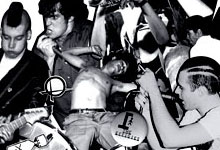
Features | Articles
You Weren't There: The History of Chicago Punk 1977-1984
By Clayton Purdom | 4 November 2009
Towards the end of You Weren’t There, someone laments that Chicago has been forgotten in punk rock’s history outside of Steve Albini’s contributions. But the documentary itself seems hellbent on proving that’s how it should stay. Albini figures in every discussion—one subsection consists exclusively of him talking shit to Articles of Faith’s Vic Bondi—and provides the film’s most lucid and nuanced insights into the city’s various scenes. His take on bands is treated not as his but as Truth. And in the film’s final third, the emergence of Big Black becomes the city’s capstone achievement, the grand final fuck-you sound everything was building toward.
I can’t really argue with this. If we’re positing, as the film does, that music from the mid-‘80s can be considered punk rock—if in other words hardcore and punk are to be used interchangeably, as the film sometimes does and sometimes doesn’t do—then the very highest the Second City could claim to place in the pantheon of US punk meccas is sixth or seventh, depending on how you count Minneapolis and Cleveland. This hardly warrants its own chapter in the history books, and the film seems to half-realize that. It implies with each new hangout or band to emerge that the true nexus of Chicago punk rock had been found. Thus each seems realer than the last until we realize we’ve passed the movement’s actual timespan and are now dealing with either kiddy hangers-on or outright post-punk, leaving the city’s “true” punk movement feeling like a zit that never quite popped.
The film, however, does well to note that it turned red, looked gross. It’s a stylish, fun, thumping documentary, apt for the subject matter. Chicago got the fashion right, which isn’t quite the diss it seems. There’s a loving and knowing treatment of Chicago within the film as a home for dilettantes, as a place not so much of violent creation as full-bodied, multicultural enjoyment. A haven for fanzines and record stores, a place more fertile for scene and enjoyment than, natch, the wriggling wet thump on the ground of a newthing born: a place where a 75-pound curmudgeon like Steve Albini can turn into a focal rock god. It seems, to its credit, too much fun for the bloodied and serious thing that was the punk rock of the Stooges, X, the Sex Pistols and the Clash. When the film dips into what punk really means, it feels like an affectation, a sort of after-the-fact grandiose bullshittery that feels unearned by the city’s actual punk contributions. One is left wondering who the “you” is in the titular accusation, the after-the-fact viewers or the city itself.
As a Chicagoan and an after-the-fact viewer, I can say I don’t feel like I missed much. At its most crotchety the film’s interviewees bemoan a lack of offensiveness in today’s music, but of course by their faux-Nazi standards nothing “offends.” That strand of offensiveness died when punk did, about a year into this documentary’s timeline, before it was ever birthed in Chicago. And anyway, I’ve go the answer. I know what offends. These guys would claw their eyes out to escape a Million Dollar Mano show.





